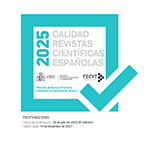Critical Dimensions in the Proliferation and Mitigation of Disinformation: A Delphi Study
Abstract
Although the spread of fake news and disinformation has historically been constant, current technology has amplified their reach and effects. Existing research has focused on the concept of disinformation, the analysis of technological and social factors that facilitate its proliferation, and the study of its effects at both social and individual levels. This study proposes future research directions to address emerging challenges in the field, focusing on its ongoing adaptation and the most effective strategies for its mitigation in the digital age. Using the Delphi method (N=16), this study reveals four general dimensions: digital environment and social media, which address the complexity of disinformation on platforms and networks; information quality and truthfulness, centered on the importance of informational integrity and ethical journalistic practices; audience competence and attention, which examine the challenge of capturing and maintaining public attention in a media-saturated environment; and polarization and hate speech, highlighting the need to combat the negative social consequences of disinformation.
Downloads
Article download
License
In order to support the global exchange of knowledge, the journal Estudios sobre el Mensaje Periodístico is allowing unrestricted access to its content as from its publication in this electronic edition, and as such it is an open-access journal. The originals published in this journal are the property of the Complutense University of Madrid and any reproduction thereof in full or in part must cite the source. All content is distributed under a Creative Commons Attribution 4.0 use and distribution licence (CC BY 4.0). This circumstance must be expressly stated in these terms where necessary. You can view the summary and the complete legal text of the licence.










